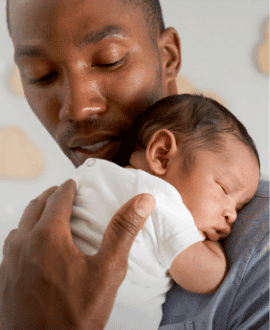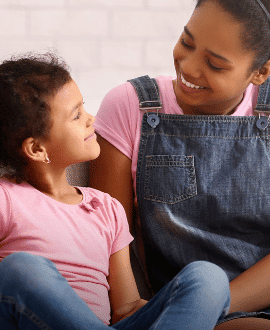What is therapeutic parenting?
“Therapeutic parenting is about creating a sense of belonging in the parent-child relationship. Boundaries are developed to increase safety and nurture is used to reduce shame.
When this is achieved, both parent and child feel safe and lovable enough to engage in a healthy attachment-bond.”
Fi Newood, foster-adopt mum, psychotherapist, author and trainer.
Why do we parent therapeutically?
Understanding the parent-child attachment bond and the impact of adverse childhood experiences is vital for care givers to understand the importance of their role in supporting the healing of developmental trauma.
The video below offers some insight into different questions we can have when parenting children who have experienced developmental trauma. These children struggle with their trust of care givers due to past experiences.
Watch a short video about childhood trauma and the brain.
How do we therapeutically parent?
“Being traumatised means continuing to organise your life, as if the trauma were still ongoing – unchanged and immutable – as every new encounter or event is contaminated by the past.”
Bessel Van Der Kolk 2015.
What supports our children to heal and grow is a safe and healthy attachment bond with a care giver who offers them a safe base from where they can go and explore the world.
A parenting approach that you can use that will promote a feeling of safety for your child or children is called PACE – Playfulness, Acceptance, Curiosity and Empathy.
PACE parenting is not a strategy or a tool, it’s a way of being. It encourages you to therapeutically engage in conversation with your child.
It’s about building up a positive parent-child relationship and reminding them that you’ll always be there for them.
It helps promote secure attachments and allows children to reflect on their thoughts and behaviours without being judged.
Trauma-informed practice
Exposure to trauma during childhood affects brain development. People who have experienced trauma, therefore, respond differently to threat.
Developmental trauma impacts on an individual’s understanding of relationships and can cause fear and anxiety even when they are no longer in the care of a negative caregiver.
By being aware, informed, sensitive and responsive to trauma, we increase our chances of helping children and young people feel safe, develop trust and invest in relationships and support services.
Promoting Stability Team (PST)
The aim of the PST is to strengthen stability within our foster families through crisis intervention and planned, time-limited, therapeutic support. We encourage a multi-agency approach, providing specialised support at the right time.
As a result, the progress and stability of our foster families is monitored by regular review meetings, so there is the opportunity to respond to difficulties and concerns as they arise. Read more about the PST here.
Therapeutic parenting training for carers
The PST provides a six-week Foundations for Attachment group which supports the parenting of traumatised children. This is complemented by an 18-week Nurturing Attachments Group, provided by our children in care CAMHS colleagues.
Both programmes have been written by Kim Golding, a Clinical Psychologist and Dyadic Developmental Practitioner (DDP network).
Watch an introduction to therapeutic parenting here.
Compassion fatigue
Compassion fatigue is described as, ‘the risk of empathic connection with the pain of others’ or put more simply, ‘the cost of caring’.
Empathy involves us opening our hearts and minds so that we can share in what others feel. When this is other people’s pain and despair, it can make us vulnerable.
Compassion fatigue is not a choice or decision but a natural response that protects us, in very challenging circumstances. We encourage our carers to come forward and talk to us if they are finding things difficult. We see this as a strength – not a weakness.
Self-care as a foster carer
Parenting children who have experienced trauma, neglect or abuse can be challenging. Without healthy, meaningful self-care, you could be operating at a deficit that can lead to burn-out, relationship struggles and feelings of inadequacy. Read more about self-care on the Anna Freud Centre website.
Additional resources
Beacon House – have a look at the information on ‘connection’, it makes a lot of sense.
Beacon House, Brainstem Calmers – activity ideas for children who have suffered early loss and trauma.
Dyadic Developmental Practice Network – big words, but it is a theory based on PACE (Playful, Accepting, Curiosity and Empathy)
Trauma and Therapeutic Parenting – great as a quick guide on further reading, including some books to read with children.
The Scared Gang – box set to read with children, written by Éadaoin Bhreathnach, Occupational Therapist and Attachment Counsellor.
The Scared Gang helps children recognise their own survival patterns through the characters, each representing a different pattern, they tell children how they can self-regulate through the use of food and sensory-based activities.
Why Can’t My Child Behave? – by Dr Amber Elliott. Friendly expert advice on how to respond to difficult behaviours and emotions for parents of children with developmental trauma.
Developmental Trauma Close Up – written for parents and carers of children who have experienced early loss, trauma and attachment disruption.
Language that cares
It is important to consider caring language with working with children who are looked after. We all use terms like ‘respite’ and ‘placements’ in front of children which is not ideal or thoughtful.
Fostering Devon is on the way to changing this negative language with the help of our children in care!
Watch a short video called ‘Changing The Narrative’.
Read a ‘what we say’ comic from Beacon House.



